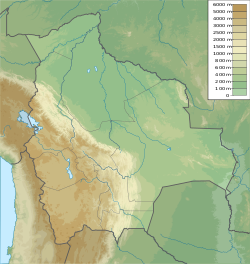The Iscayachi Formation, in older literature also referred to as Guanacuno Formation, is an extensive Tremadocian geologic formation of western and southern Bolivia. The shales and sandstones were deposited in a shallow marine to pro-delta environment.[1][2][3][4][5] The formation reaches a thickness of 1,000 metres (3,300 ft).[1]
| Iscayachi Formation | |
|---|---|
| Stratigraphic range: Tremadocian ~ | |
| Type | Geological formation |
| Thickness | 1,000 m (3,300 ft) |
| Lithology | |
| Primary | Shale, sandstone |
| Location | |
| Coordinates | 22°00′S 65°00′W / 22.0°S 65.0°W |
| Approximate paleocoordinates | 46°18′S 128°18′W / 46.3°S 128.3°W |
| Region | Potosí & Tarija Departments |
| Country | |
| Type section | |
| Named for | Iscayachi |
Fossil content
editThe formation has provided the following fossils:
- Akoldinoidia sinuosa[6]
- Altiplanelaspis palquiensis[7]
- Angelina hyeronimi, A. punctalineata[8]
- Asaphellus communis, A. riojanas
- Deltacare prosops
- Conophrys erquensis[9]
- Golasaphus palquiensis[7]
- Jujuyaspis keideli
- Kainella andina,[6] K. meridionalis
- Kvania lariensis
- Leptoplastides mariana
- Macrocystella bavarica
- Micragnostus hoeki
- Onychopyge branisai[10]
- Parabolinella argentinensis, P. boliviana[11]
- Pharostomina alvarezi, P. trapezoidalis[12]
- Rhabdinopora flabelliformis
- Rhadinopleura incaica[10]
- Rossaspis rossi
- Saltaspis steinmanni[11]
- Shumardia erquensis
- Leptoplastides cf. granulosa[13]
- Altiplanelaspis sp.
- Araiopleura sp.
- Broeggeria sp.
- Ctenodonta sp.
- Dictyonema sp.
- Koldinioidia sp.
- Leiostegium sp.
- Nanorthis sp.
- Onychopyge sp.
- Palquiella sp.
- Parabolina sp.
- Saltaspis sp.
- Sphaerocare sp.
- Trilobitarum sp.
- Tropidodiscus sp.
See also
editReferences
edit- ^ a b Suárez Riglos et al., 2018, p.37
- ^ Quebrada de Rota at Fossilworks.org
- ^ Palqui at Fossilworks.org
- ^ Tres Cruces at Fossilworks.org
- ^ Iscayachi Formation at Fossilworks.org
- ^ a b Suárez Riglos et al., 2018, p.52
- ^ a b Suárez Riglos et al., 2018, p.43
- ^ Suárez Riglos et al., 2018, p.48
- ^ Suárez Riglos et al., 2018, p.53
- ^ a b Suárez Riglos et al., 2018, p.45
- ^ a b Suárez Riglos et al., 2018, p.51
- ^ Suárez Riglos et al., 2018, p.42
- ^ Suárez Riglos et al., 2018, p.47
Bibliography
edit- Suárez Riglos, Mario; Dalenz Farjat, Alejandra; Pérez Leyton, Miguel Ángel (2018), Fósiles y Facies de Bolivia (PDF), Sincronía Diseño & Publicidad, Santa Cruz de la Sierra, pp. 1–146, ISBN 978-99974-79-68-6, retrieved 2019-03-03
Further reading
edit- J. L. Benedetto. 2007. New Upper Cambrian-Tremadoc rhynchonelliformean brachiopods from northwestern Argentina: evolutionary trends and early diversification of plectorthoideans in the Andean Gondwana. Journal of Paleontology 81(2):261-285
- A. Pribyl and J. Vanek. 1980. Ordovician trilobites of Bolivia. Rozpravy Ceskoslovenske Akademie Ved. Rada Matematickych a Prirodnich Ved. Academia Praha, Prague, Czechoslovakia 90(2):1-90
- R. Suárez Soruco. 1976. El sistema ordovícico en Bolivia. Revista Tecnica YPF Bolivia 5(2):111-123
